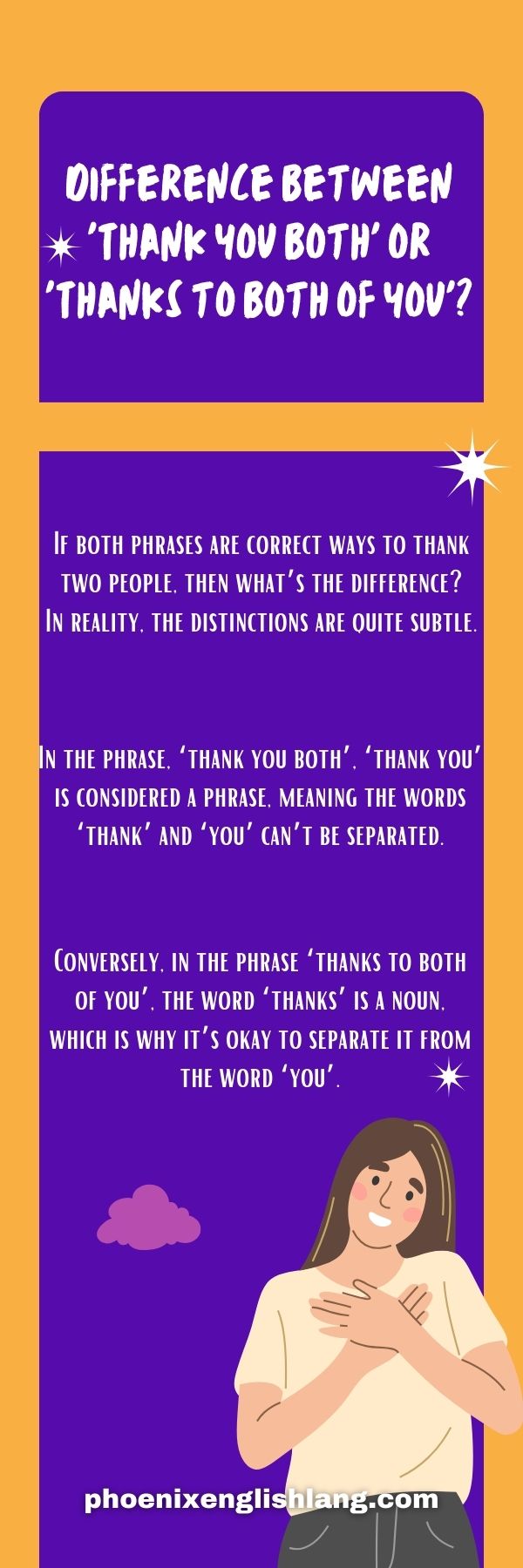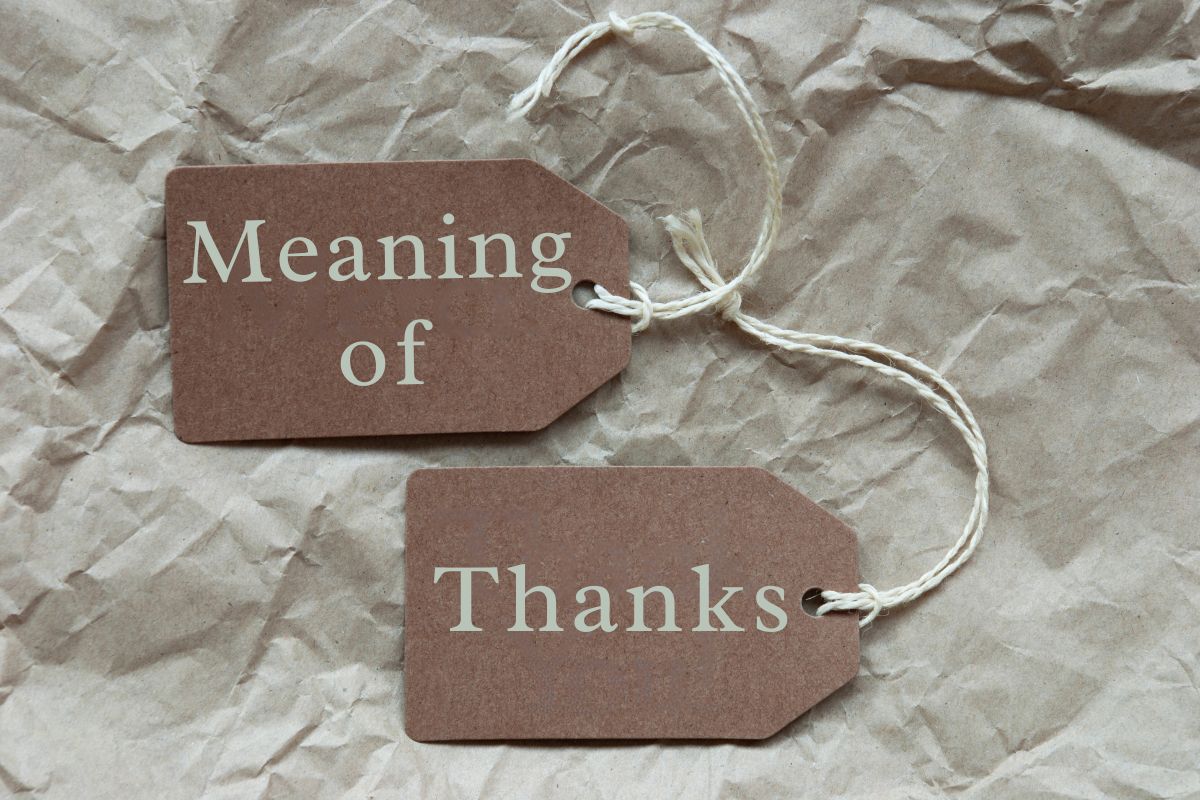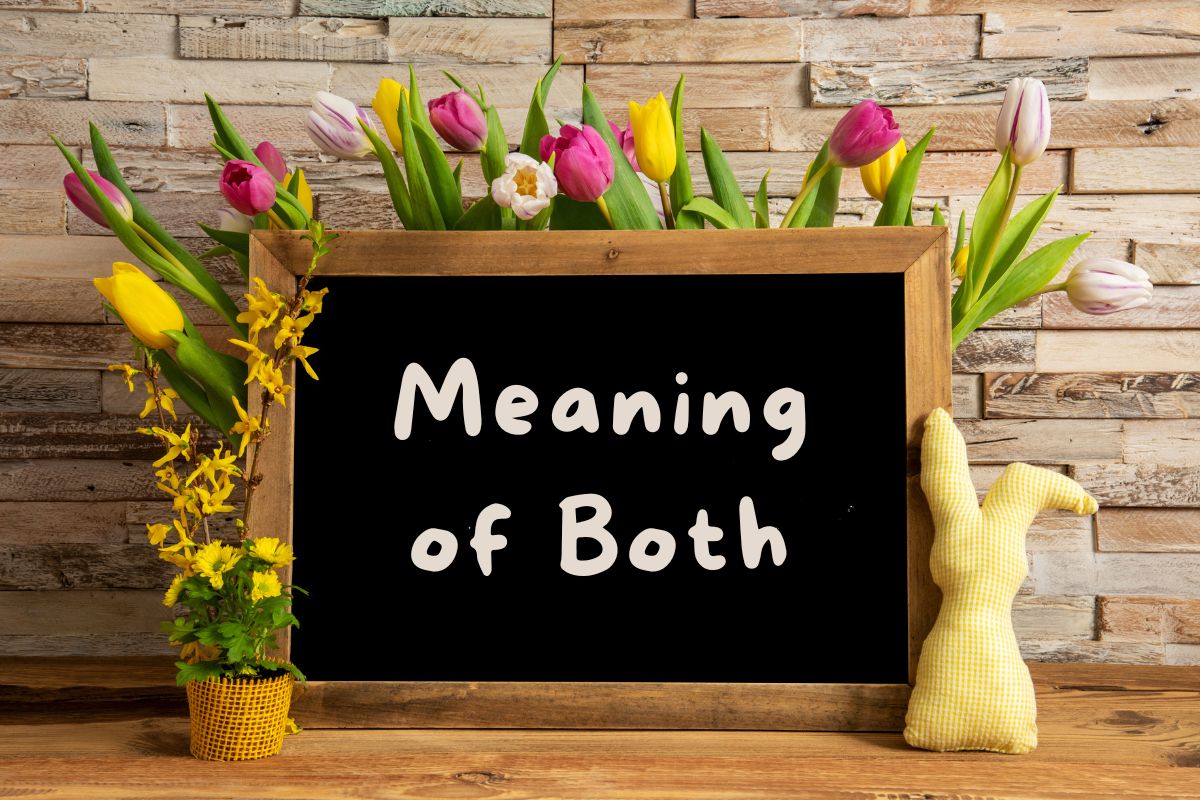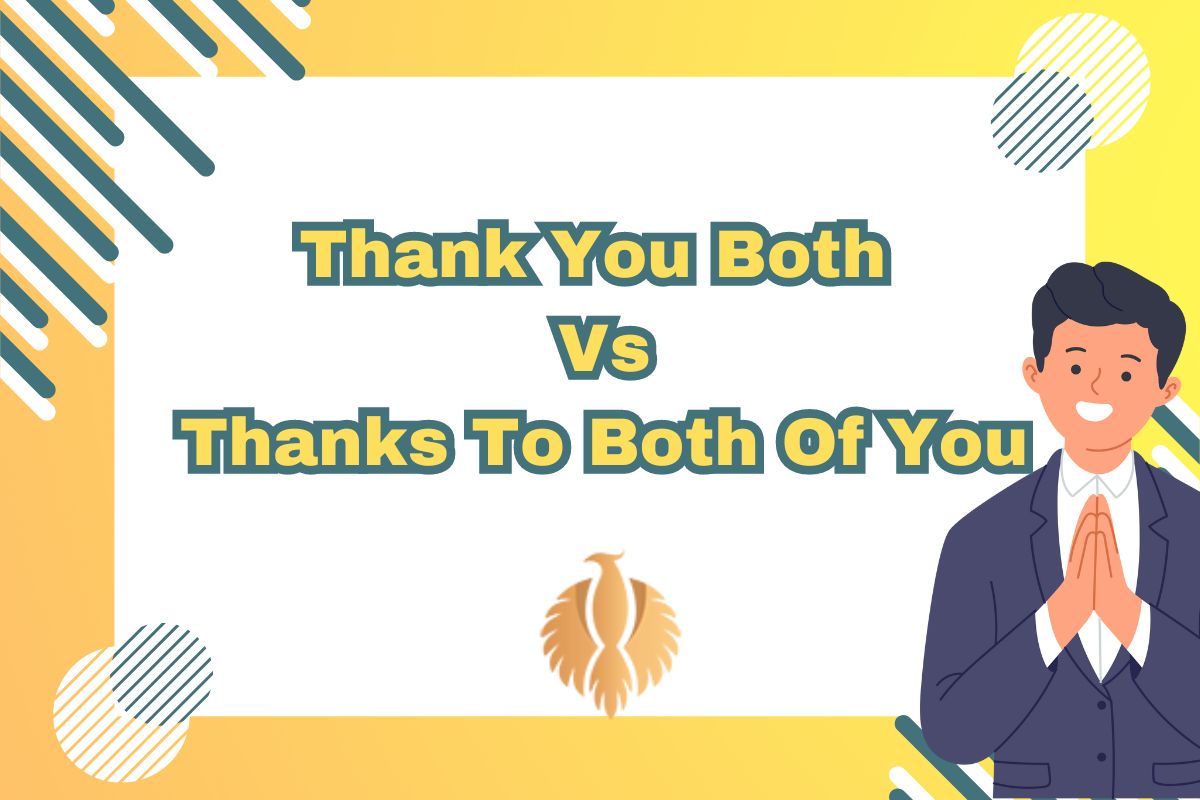In this article, I’m going to teach you the differences between these two phrases. “Thank you both” and “Thanks to both of you” are both polite expressions of gratitude, but they have slightly different nuances.
“Thank you both” is a concise way to express appreciation to two individuals. It is a straightforward and direct way to acknowledge the efforts or assistance of both persons.
“Thanks to both of you” adds the element of attribution, emphasising that the gratitude is directed towards both individuals specifically. It highlights the role of both people in contributing to the situation or outcome for which you are grateful.
Both phrases are appropriate and polite, so you can choose the one that feels most fitting for the context and the level of formality you wish to convey.
The phrase “Thank you both” or “Thanks to both of you” is a common expression of gratitude in English. Its origins can be traced to the general evolution of language and social customs.
There isn’t a specific historical origin for this particular phrase, as it’s a natural development in the way people express appreciation for the efforts or kindness of others.
Difference Between ‘Thank You Both’ or ‘Thanks to Both of You’?

If both phrases are correct ways to thank two people, then what’s the difference?
In reality, the distinctions are quite subtle.
In the phrase, ‘thank you both’, ‘thank you’ is considered a phrase, meaning the words ‘thank’ and ‘you’ can’t be separated.
Conversely, in the phrase ‘thanks to both of you’, the word ‘thanks’ is a noun, which is why it’s okay to separate it from the word ‘you’.
You might also enjoy: What Kind of Vs What Kinds of Differences + Examples [2024]
Here, I’m going to provide 30 sentences with the phrase “thank you both”

1. “Thank you both for your assistance. It was invaluable.”
2. “I wanted to express my gratitude to you both. Thank you!”
3. “Thank you both for being there for me when I needed support.”
4. “I couldn’t have done it without you. Thank you both!”
5. “Your teamwork and dedication are greatly appreciated. Thank you both.”
6. “Thank you both for going above and beyond to help me out.”
7. “I wanted to extend my heartfelt thanks to you both for your kindness.”
8. “Thank you both for your time and effort. It means a lot to me.”
9. “You both truly make a difference. Thank you for everything.”
10. “Thank you both for your unwavering support. It means the world to me.”
11. “I am grateful to you both for your guidance and mentorship.”
12. “Thank you both for being such amazing friends. I’m lucky to have you.”
13. “Thank you both for being reliable and trustworthy. It means a great deal.”
14. “Your contributions have made a significant impact. Thank you both.”
15. “I wanted to take a moment to say thank you to you both for your generosity.”
16. “Thank you both for believing in me and pushing me to do my best.”
17. “You both have made a positive difference in my life. Thank you!”
18. “Your support and encouragement have been invaluable. Thank you both.”
19. “I wanted to express my deepest gratitude to you both. Thank you from the bottom of my heart.”
20. “Thank you both for your patience and understanding. It means a lot to me.”
21. “Your dedication and hard work are commendable. Thank you both.”
22. “Thank you both for your collaboration and teamwork. It is greatly appreciated.”
23. “I wanted to extend my sincere thanks to you both for your kindness and generosity.”
24. “Thank you both for always being there for me. Your friendship is priceless.”
25. “Your contributions have made a significant impact on our project. Thank you both.”
26. “Thank you both for your professionalism and expertise. It has been a pleasure working with you.”
27. “I wanted to express my heartfelt thanks to you both for your support during this challenging time.”
28. “Thank you both for your positive attitude and enthusiasm. It makes a difference.”
29. “Your assistance has been invaluable. Thank you both for your help.”
30. “I wanted to take a moment to express my gratitude to you both. Thank you for everything you do.”
You might also enjoy: Moment Vs Momment: Spelling + Definition + Usage
Here are 30 sentences with the phrase “thanks to both of you”

1. “Thanks to both of you for your hard work and dedication.”
2. “I wanted to extend my gratitude to both of you. Thank you!”
3. “Thanks to both of you, we were able to achieve our goals.”
4. “I couldn’t have done it without your support. Thanks to both of you!”
5. “Your efforts have made a significant impact. Thank you to both of you.”
6. “Thanks to both of you for going the extra mile. It is greatly appreciated.”
7. “I wanted to express my sincere thanks to both of you for your help.”
8. “Thanks to both of you for your valuable contributions. It means a lot to me.”
9. “I am truly grateful for your assistance. Thanks to both of you.”
10. “Thanks to both of you for your unwavering commitment. It does not go unnoticed.”
11. “I wanted to extend my appreciation to both of you for your guidance and support.”
12. “Thanks to both of you for being such amazing friends. I am lucky to have you.”
13. “Thank you, both of you, for your reliability and trustworthiness.”
14. “Your dedication has made a difference. Thanks to both of you.”
15. “I wanted to take a moment to say thanks to both of you for your generosity.”
16. “Thanks to both of you for believing in me and pushing me to succeed.”
17. “Your friendship has been invaluable. Thanks to both of you.”
18. “I wanted to express my deepest gratitude to both of you. Thank you from the bottom of my heart.”
19. “Thanks to both of you for your patience and understanding. It means a lot to me.”
20. “Your support and encouragement have been invaluable. Thanks to both of you.”
21. “I am grateful to both of you for your collaboration and teamwork.”
22. “Thanks to both of you for your professionalism and expertise. It has been a pleasure working with you.”
23. “I wanted to extend my sincere thanks to both of you for your kindness and generosity.”
24. “Thanks to both of you for always being there for me. Your friendship is treasured.”
25. “Your contributions have made a significant impact on our success. Thanks to both of you.”
26. “Thank you, both of you, for your positive attitude and enthusiasm. It is inspiring.”
27. “I wanted to express my heartfelt thanks to both of you for your support during challenging times.”
28. “Thanks to both of you for your exceptional skills and dedication. You are a fantastic team.”
29. “Your assistance has been invaluable. Thanks to both of you for your help.”
30. “I wanted to take a moment to express my gratitude to both of you. Thanks for making a difference.”
With a myriad of different ways to thank someone in the English language, it can be somewhat confusing to know the correct turn of phrase to use.
Especially once you start to throw in variables such as multiple people and even objects. ‘Thank you both’ or ‘thanks to both of you’ is one of those phrases.
In this article, we’re going to help answer a question our readers have been asking: should we be saying ‘thank you both’ or ‘thanks to both of you’?
Meaning of ‘Thanks’

Basic Definition
- “Thanks” is a colloquial term used to express gratitude or appreciation toward someone for something they’ve done.
- It is commonly used in informal contexts to acknowledge someone’s efforts or kindness.
Contextual Understanding
- “Thanks” is often used in casual conversations and social situations rather than formal ones.
- It is a universal expression used in everyday interactions, making it easily understood by most English speakers.️
Emotional Significance
- Saying “thanks” acknowledges that someone has provided assistance or support, fostering positive social interactions.
- Expressing thanks can strengthen personal and professional relationships by showing appreciation.
Variations and Forms
- “Thanks” can be used alone or extended into phrases like “thank you,” “thank you very much,” or “thanks a lot.”
- Different cultures and regions might have variations in how thanks is expressed, but the concept remains similar.
Use Cases
- Commonly used in daily conversations, such as after receiving help, gifts, or compliments.
- Used in workplaces to acknowledge colleagues’ contributions or assistance.
Politeness and Etiquette
- Expressing thanks is considered a social norm and a basic element of politeness in many cultures.
- In many social situations, saying thanks is expected, especially in response to someone doing something nice.
Cultural Significance
- Some cultures place a higher emphasis on expressing gratitude, while others incorporate it more subtly into interactions.
- The act of giving thanks is often tied to recognizing kindness and generosity in society.
Psychological Effects
- Expressing thanks can improve the mood of both the person giving and receiving it.
- Cultivating an attitude of gratitude, including frequent use of “thanks,” can lead to positive thinking and well-being.
Communication
- “Thanks” can be conveyed through tone of voice, facial expressions, and body language, enhancing its meaning.
- Used in written communication, such as thank-you notes, emails, and messages, to express appreciation.
Frequency and Usage
- “Thanks” is one of the most frequently used expressions in the English language.
- Informal substitutes include “cheers,” “props,” or “kudos,” which convey gratitude in a more relaxed manner.
Situational Usage
- Most often used for minor favors, like holding a door open or passing an item.
- Expressed in scenarios involving emotional support, friendship, or encouragement during difficult times.
Reflexive Aspect
- Interestingly, one can also use “thanks” when reflecting on one’s achievements or insights, encompassing self-appreciation.
Limitation
- In certain contexts, simple “thanks” may not fully convey the depth of gratitude required, necessitating a more elaborate expression.
Conclusion
- Despite its simplicity, “thanks” carries significant weight in social interactions and can have profound effects.
- Expressing thanks can encourage others to continue being helpful or kind in the future.
- Using phrases of gratitude is a key component of emotional intelligence and interpersonal skills.
Psychological Perspective
- Feeling appreciated can lead to a sense of fulfillment and increase motivation for further kindness.
- Often leads to a cycle of kindness; expressing thanks can prompt others to act kindly in return.
- “Thanks” will likely remain a timeless expression of human interaction and appreciation, transcending cultural and language barriers.
You might also enjoy: Vagrant Vs Hobo: 6 Main Differences + Examples [2024]
Meaning of ‘Both’

The word ‘both’ serves to refer to two people or things. It’s a word that can be included in a sentence to bring attention to the fact that the statement being made relates to the two people or things.
‘Both’ can be a pronoun, determiner, or predeterminer.
The Use of ‘Both’ to Emphasise In ‘Thank You Both’ or ‘Thanks to Both of You’
The phrase ‘thank you’ can, in and of itself, be used in both singular and plural contexts.
This means you can use it to thank just one person, two people, or a group of people. Picture for instance an actor receiving an award, and going on stage and emotionally saying into the mic: “Thank you”.
So why, when, bring in the use of the word ‘both’?
The word ‘both’ comes in to emphasise the fact that the statement you are making includes the two recipients you are addressing.
Imagine, for instance, that a couple hosted you for dinner. During dinner, you thank them, but one of them downplays their role in preparing the dinner by saying their wife put in most of the work.
At the end of the dinner, you might want to make use of the word ‘both’ to show that you are grateful to the two of them, even though one of them doesn’t feel worthy of the appreciation.
In this instance, you could use both ‘thank you both’ and ‘thanks to both of you’.
So which of the two expressions should you use? ‘Thank you both’ or ‘thanks to both of you’?
The truth is, these are both correct and carry the same meaning in many different contexts. In the phrase ‘thank you both’, ‘both’ is short for ‘both of you’.
The main thing to remember is that with either phrase, you are using it to thank two people. It won’t work for just one person, and it won’t work for more than two, either.
‘Thanks to’ as an Idiom
There’s an interesting twist with the term ‘thanks to’ since it’s also used as an idiom.
You can use it to express the fact that you know something was achieved due to the help of someone else. Or in other words, that something happened because of someone.
For instance, if your parents told you about a vacancy they saw posted online, you might say:
- Thanks to my parents, I got a new job.
If you wanted to thank them directly, you might say: - Thanks to both of you, I got a new job.
The same structure can also be used sarcastically. For instance, if your friends were late to meet you at the train station, you might say: - Thanks to Sally and Hannah, we missed the train.
- Thanks to both of you, we missed the train.
As you can see, in this context, you can only use ‘thanks to both of you’. The use of ‘thank you both’ would be incorrect.
This is the only time when you can use one but not the other term when choosing between ‘thank you both’ or “thanks to both of you’.
Expressing Thank a Group of More than Two People

What if you want to thank more than just two people? As we saw previously, the word ‘both’ can only be applied to contexts where two people are being thanked.
As such, ‘thank you both’ or ‘thanks to both of you’ are appropriate to use in this context.
Read on for some examples of correct ways to thank a group of people:
- Thank you all
- Thanks to all of you
- Thanks to everyone here
- Thanks to each and every one of you
- Thank you to my family who’ve always supported me
- Thanks everybody or Thanks everyone
You might also enjoy: Emersion Vs Immersion: Meaning, Differences, and Examples
Alternatives for Thank You

Did you know that the English language has hundreds of ways of saying thank you, perhaps even more?
Many of these don’t even include the word ‘thanks’. Here are some of our favourites:
- Much obliged
- Thanks a bunch
- Please accept my endless gratitude
- Cheers
- I appreciate it
- I am extremely grateful
- Shout out to my mom for always supporting me
- Thank you from the bottom of my heart
- Ta

Hi, welcome to my blog! My name is Omid and I am thrilled to have you here! I am an English language teacher with 12 years of experience and hold multiple international certifications (TESOL, IELTS, TOEFL, PTE, CELTA). Additionally, I hold a PhD in Applied Linguistics with a specialization in Teaching English as a Second Language (TESL), which fuels my passion for teaching English and assisting others in mastering the language. To me, nothing is more rewarding than helping individuals enhance their English language abilities through various methods. So, let’s embark on this journey of learning English together.




